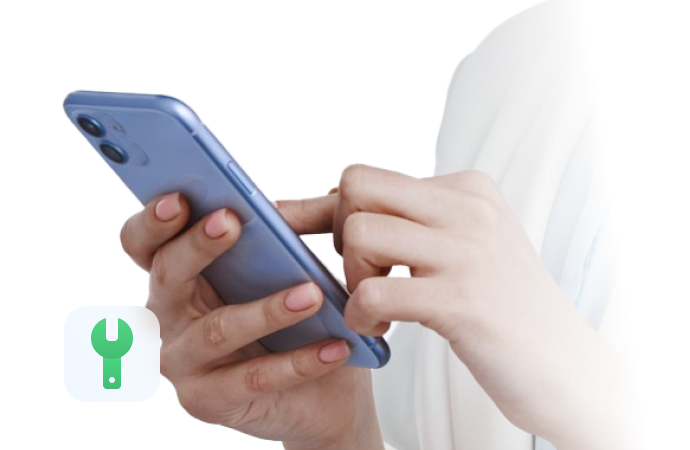
How to Restore & Unjailbreak an iPhone/iPad
[iPhone 17 Supported]
iPhone Backup
- iPhone Data Backup
- 1. Back up iPhone in Recovery Mode
- 2. Back Up iPhone With/Without iTunes
- 3. Back up iPhone to Mac
- 4. Back up iPhone/iPad to Computer
- 5. Back up iPhone to Mac Catalina
- 6. Back up Jailbreak Apps And Restore
- 7. iPhone Backup Software
- 8. Back up iPhone/iPad Easily
- 9. Back up iPhone/iPad in DFU Mode
- 10. Back up iPhone Apps and App Data
- 11. Back up Notes on iPhone and iPad
- 12. Back up iOS to External Hard Drive
- 13. Export Notes from iPhone to PC/Mac
- 14.Back up iPhone Photos to Google Photos
- 15. Back Up Your iPhone Voicemails
- 16. Back Up to External Drive
- 17.How to Back Up to NAS
- 18.Back Up iPhone With Broken Screen
- 19.Back Up iPhone to Google Drive
- 20.Buy Used iPhones
- 21.Sell Used Phone for Cash
- 22.Sell Used iPhone for Dollar
- 23.How Much is My iPhone Worth
- iPhone Data Recovery
- 1. Recover iPhone Data Without Backup
- 2. Restore Calendar on iPhone
- 3. Recover Call History on iPhone
- 4. Recover iPhone Lost Data
- 5. Restore iPhone in Recovery Mode
- 6. Undelete iPhone Backup Files
- 7. Recover Deleted iPhone Messages
- iPhone Data Restore
- 1. Restore iPhone from iTunes Backup
- 2. Restore iPhone after Downgrade
- 3. Restore iPhone from Backup
- 4. Restore iPhone from iPad Backup
- 5. Restore iPhone from DFU Mode
- 6. Restore iPhone Deleted Text Message
- iPhone Backup Problems
- 1. Find iPhone Backup Location on Mac
- 2. iPhone Backup Password Never Set
- 3. iPhone Backup Password Forget
- 4. iCloud Backup Taking Forever
- 5. iPhone Won't Backup to iCloud
- 6. iTunes Won't Backup iPhone
- iPhone Restore Problems
- 1. iTunes Stuck on Verifying iPhone
- 2. Not Space to Restore iPhone Backup
- 3. iTunes Backup Not Restoring
- 4. iPhone Won't Restore
- WhatsApp Backup & Restore
- 1. WhatsApp from Google Drive to iOS
- 2. Restore Old WhatsApp Backup
- 3. Restore WhatsApp Chat on iPhone
- 4. Retrieve WhatsApp Chat History
- 5. See Deleted Messages on WhatsApp
- 6. Restore WhatsApp Stuck on iPhone
- 7. iPhone WhatsApp to Google Drive
- 8. Back Up WhatsApp on iPhone
- 9. Backup WhatsApp Data before Changing Number
- iPhone Backup Tips
- 1. Extract Data From iPhone
- 2. Encrypt iPhone Backup
- 3. Reset iPhone Backup Password
- 4. Extract iPhone Backup in Win 10
- 5. How Long take iPhone to Backup
- 6. Find iPhone Backup Location
- 7. iPhone Backup Password
- 8. View iPhone Backup on Computer
- 9. iPhone Backup with iTunes/iCloud
- 10.Check Last Backup on iPhone
- 11.How To Encrypt iPhone Backup
- 12. Best Backup Chargers for iPhone
- 13. Speed Up Your iPhone Backups
- 14. Save Data When iPhone Disabled
- ● Manage/transfer/recover data
- ● Unlock screen/activate/FRP lock
- ● Fix most iOS and Android issues
- Back up Now Back up Now Back up Now
Nov 12, 2025 • Filed to: Backup & Restore Solutions • Proven solutions
Dr.Fone Basic:
Better Control for Your Phone
Manage, transfer, back up, restore, and mirror your device
Have you faced issues with your jailbroken iPhone or iPad that prevent it from working properly? Many users share the same concerns, especially when worried about the risks of restoring their device. If you’re wondering how to restore jailbroken iPhone, including the latest iPhone 17, you’re not alone. With the right tools and clear guidance, you can safely restore your jailbroken device to normal and regain reliable performance without unnecessary risks.

In this article, we'll discuss the essential steps and precautions you need to take to restore your jailbroken iPhone or iPad. We understand the frustration and concern of this process, which is why we're here to help. Following our expert tips, you can say goodbye to the uncertainty of restoring a jailbroken device. At the end of this guide, you can enjoy a smoothly functioning iOS device again. Read on to learn more.
- 3 Methods to Restore Jailbroken iPhone/iPad
- [BONUS] How to Restore iPhone/iPad Without Losing Jailbreak
- How to Safely Restore Jailbroken iPhone/iPad with Dr.Fone

3 Methods to Restore Jailbroken iPhone/iPad
Restoring a jailbroken iPhone or iPad can be essential for troubleshooting or preparing the device for resale. Whatever your reasons for restoring your devices, finding safe ways to do it is still frustrating and difficult. Here are three effective methods to restore your jailbroken iPhone:
Method 1: Using Unc0ver
Unc0ver is a popular jailbreak tool for iOS devices, but it also provides an option for users wondering how to restore jailbroken iPhone or iPad to its original state. Through its RootFS Restore feature, Unc0ver can completely remove the jailbreak and reset the device’s filesystem back to its pre‑jailbroken condition. Here’s how you can use Unc0ver to safely restore your jailbroken device:
- Step 1: Open the Unc0ver app on your iPhone and tap the Settings icon at the top to access the app's settings.
- Step 2: Ensure that only the "Refresh Icon Cache" and "Restore RootFS" options are enabled. Tap "Done" to save the settings.
- Step 3: Tap the "Restore RootFS" button on the main screen, which replaces the "Jailbreak" or "Rejailbreak" option.
- Step 4: After Unc0ver completes this process, your iPhone will reboot, and Cydia will be removed. Finally, delete the Unc0ver app from your device.

Note: If you receive an error message when tapping the "Restore RootFS" button, try restarting your iPhone. Then, retry the process with your device in Airplane Mode.
Method 2: Using iTunes
One of the most common methods for users searching how to restore jailbroken iPhone or iPad is through iTunes. As Apple’s official tool, iTunes integrates the latest iOS security features, making it a reliable choice for removing a jailbreak and restoring your device to factory settings. Follow these steps to safely restore your jailbroken device using iTunes:
- Step 1: Connect your iPad to your PC/MAC using a USB cable. Once connected, iTunes will recognize and list your device under the "Settings" section. In the "Summary" tab, locate and select the "Restore" option. This will prompt iTunes to present you with a list of recovery options for your iPad.

- Step 2: Since you are restoring a jailbroken iPad, it is crucial not to create a backup. When prompted, select the "Don’t Back Up" option to proceed. iTunes will ask for confirmation to restore your iPad. Click the "Restore" button to start restoring your jailbroken iPhone.
- Step 3: After the restoration process, your iPad will restart normally. After restarting, you may be prompted to restore from a previous backup. Select the "Use as new" option to ensure that your iPad remains in a jailbroken state.
Method 3: Using Finder
Removing a jailbreak from your iPhone using a Mac is a straightforward process that involves restoring the device to its factory settings or a previous backup. Follow these steps to effectively restore your iDevice
- Step 1: Connect your iPhone or iPad to your Mac using a USB cable. Open Finder on your Mac and select your iPhone from the sidebar under "Locations."
- Step 2: To completely reset your iPhone to factory settings, click on "General" in the menu that appears, then select "Restore iPhone" near the bottom of the window.

- Step 3: Click "Restore Backup" to restore your iDevice from a backup. Ensure that you choose a backup from before you jailbroke your iPhone.
- Step 4: Follow the onscreen instructions to complete the restoration process. Your iPhone will restart once the restoration is complete.
Note: If your iPhone does not appear in Finder for restoration, you can try putting it into DFU (Device Firmware Update) mode before restoring. Here's how:
- Step 1: Power off your iPhone.
- Step 2: For iPhones with a Home button: Press and hold the power button for three seconds, then press and hold the Home button. Continue holding the power button, but release the Home button after 10 seconds.
- Step 3: For iPhones without a Home button: Quickly press the volume up button, then the volume down button. Hold down the power button until the screen turns off. Quickly press and hold the volume down and power button, then continue holding the volume button for about 15 seconds.
- Step 4: Your iPhone should now be in DFU mode and appear in Finder. You can then proceed with the instructions above to restore your device.
Note: Restoring a jailbroken iPhone using a Mac or DFU mode can effectively remove the jailbreak and restore your device to its original state. However, restoring your iPhone will erase all data on the device, so back up any important information before proceeding.
[BONUS] How to Restore iPhone/iPad Without Losing Jailbreak
Want to refresh your iPhone or iPad but worried about losing the valuable tweaks and customizations from jailbreaking? Restoring a device while keeping the jailbreak can be challenging, yet it’s possible. In this section, we’ll explain how to restore jailbroken iPhone or iPad without losing your jailbreak, so you can enjoy a refreshed device while maintaining your custom features.
- Step 1: Before you can begin the restoration process, you must have the Cydia package on your computer. Once you have Cydia, you must download iLex RAT, allowing Cydia to restore your jailbroken iPad. To configure Cydia and download iLex RAT, follow these steps:
- 1.1: Open Cydia and go to the "Manage" tab at the bottom of the screen.
- 1.2: Select "Sources" and tap the "Edit" button.

- 1.3: Click on the "Add" button and enter the following URL: http://cydia.myrepospace.com/ilexinfo/
- 1.4: Once the URL is added, search for iLex RAT and install it on your device.
- Step 2: You can begin restoration once you have successfully configured Cydia and installed iLex RAT. Follow these steps to restore your iPad without losing the jailbreak:
- 2.1: Open iLex RAT on your iPad and select the option to restore your device.
- 2.2: Follow the onscreen instructions to complete the restoration process.
- 2.3: Once the restoration is complete, your iPad will restart, and your jailbreak should remain intact.
Note: Restoring a jailbroken iPad can be risky. One wrong move could result in losing your jailbreak or disabling your device. It's essential to carefully read and understand the instructions before proceeding to ensure a successful restoration without losing the jailbreak.
How to Safely Restore Jailbroken iPhone/iPad with Dr.Fone
Dr.Fone - System Repair (iOS) provides a comprehensive set of tools to manage and repair iOS devices. A standout feature is iOS Standard Repair, which fixes a wide range of system issues while keeping your data safe. Unlike other methods that may erase your information, this mode ensures all files, photos, and personal data remain intact throughout the repair process. It is fully compatible with iPhones—including the latest iPhone 17—as well as iPads and iPod Touch, making it highly versatile. For users exploring solutions such as how to restore jailbroken iPhone securely, Dr.Fone’s system repair offers a safe, reliable option.
- Step 1: After downloading Dr.Fone on your computer, open the program and navigate to the Toolbox section. From there, select System Repair to begin the process.

- Step 2: Connect your iOS device to the computer using a USB cable. Once connected, Dr.Fone will detect your device automatically. Select the iOS option to proceed. In the next window, choose iOS Repair to initiate the repair process for your iOS device.
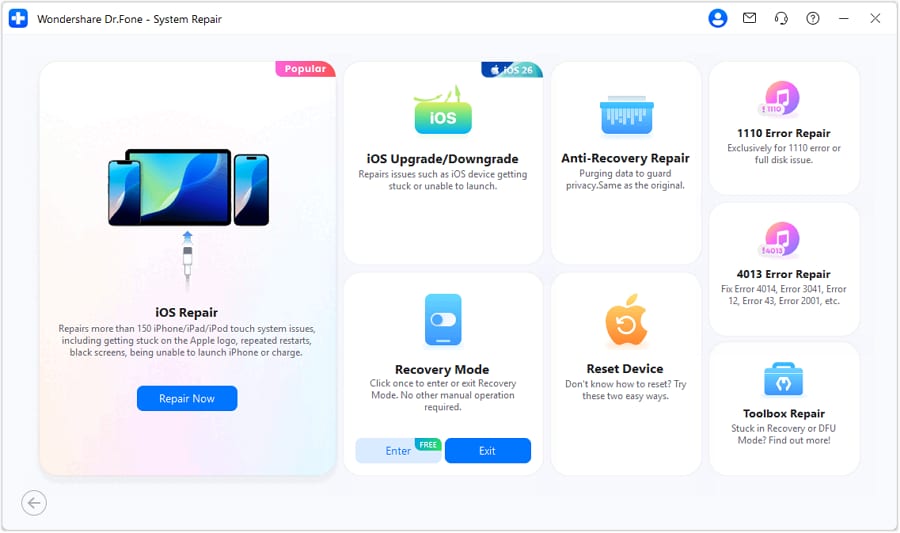
- Step 3: From the repair modes provided, select Standard Repair. This mode ensures that all your data is retained during the repair process.
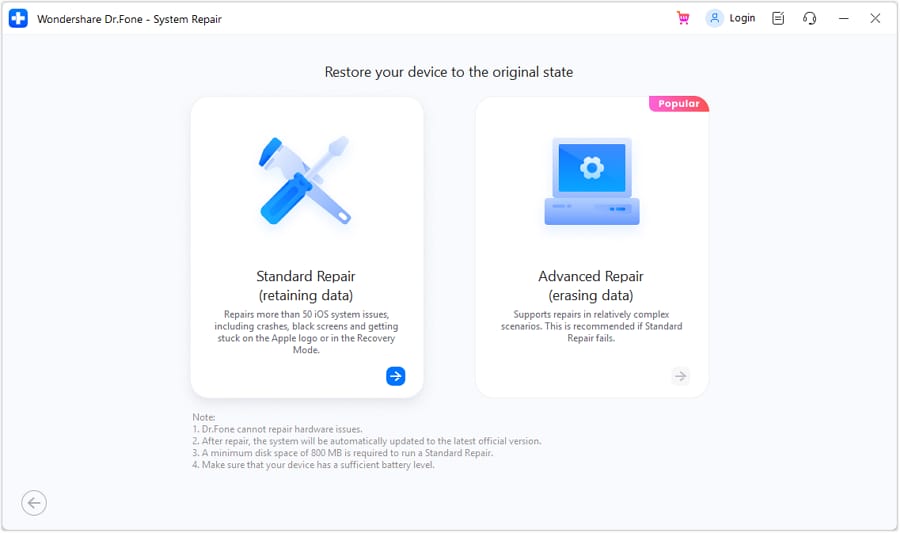
- Step 4: Follow the instructions to put your iOS device into Recovery Mode. This step is crucial for Dr.Fone to effectively repair your device.
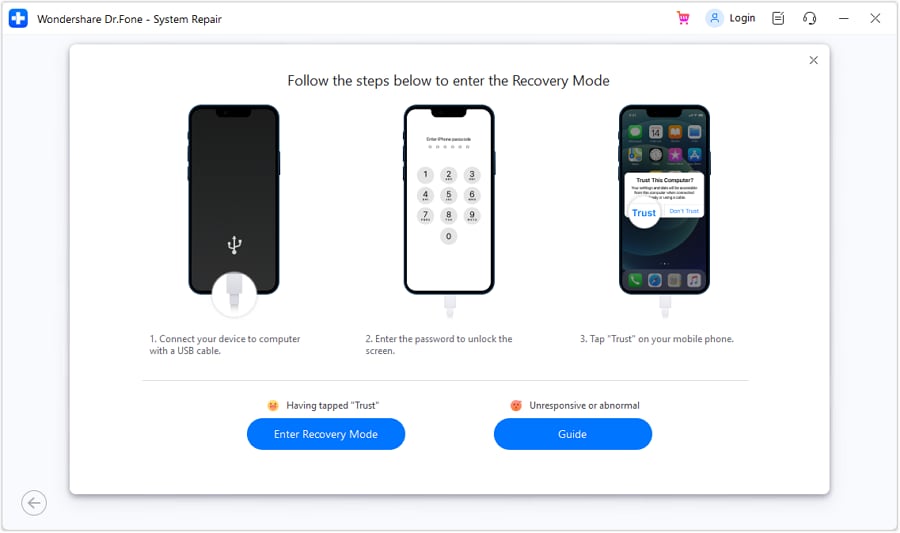
- Step 5: Once your device is in Recovery Mode, Dr.Fone will automatically detect the appropriate iOS firmware. Click on the Download button to proceed with downloading the firmware. Dr.Fone will begin downloading the iOS firmware for your device. Depending on your internet connection speed, this process may take some time.
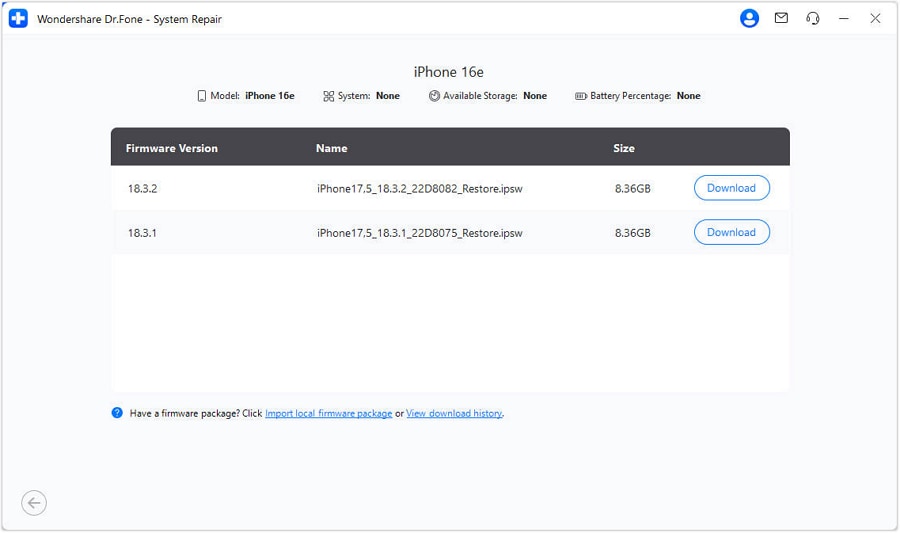
- Step 6: After downloading the firmware, Dr.Fone will verify it before installing it on your iOS device. Click on Repair Now to start the installation process. Keep your device connected to the computer and monitor the progress of the firmware installation. Ensure that your device remains connected throughout this process.
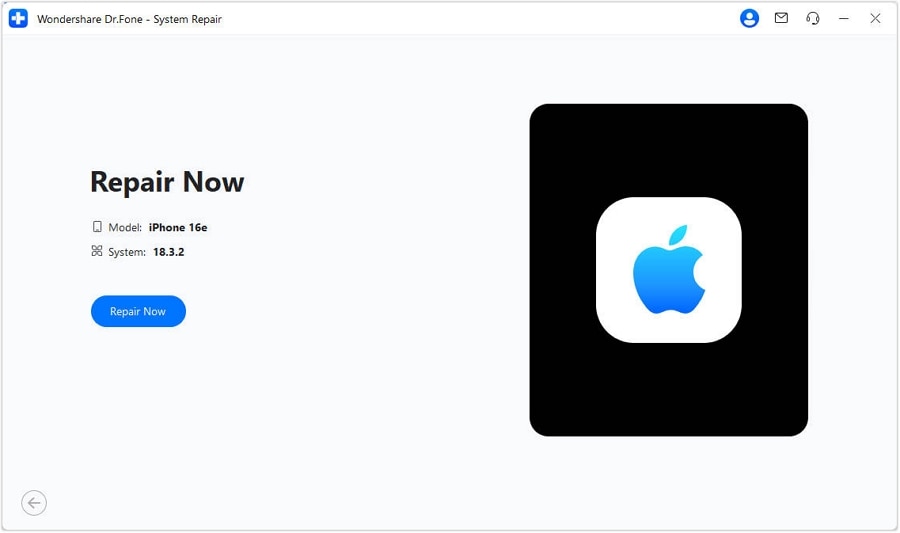
- Step 7: Dr.Fone will notify you once the installation is complete. Click on Done to finish the repair process. Your iOS device should now be repaired, and all your data should be preserved.
Note: If Standard Repair doesn't fix your iOS device, Dr.Fone's Advanced Repair option can help. This mode checks your device more thoroughly for serious issues, but it will erase all your data. Be sure to back up your data before using Advanced Repair.
Conclusion
Wondering how to restore jailbroken iPhone or iPad? The process may seem daunting, but with the right tools it can be done safely and efficiently. By following the steps in this guide, you can return your device to its original state and enjoy a smooth iOS experience—even on the latest iPhone 17. Always back up your data before starting to prevent potential loss. For those who want to restore a jailbroken device without losing photos, messages, or other files, try Wondershare Dr.Fone - System Repair (iOS). Its intuitive interface and comprehensive features make it a reliable choice for iOS device maintenance.
Dr.Fone Basic:
Better Control for Your Phone
Manage, transfer, back up, restore, and mirror your device
[iPhone 17 Supported]

















Daisy Raines
staff Editor